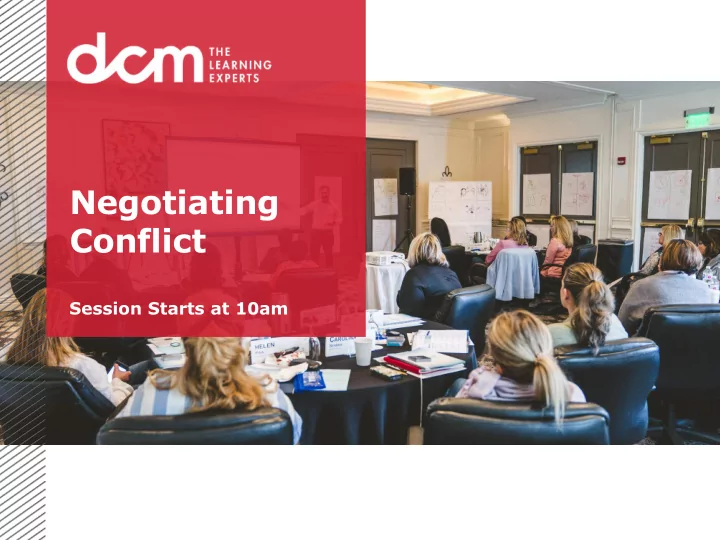

Negotiating Conflict Session Starts at 10am
What is Negotiation? What skills does a negotiator need to have? • Negotiation is a job, process, art. It evokes complex feelings for anyone faced with the prospect of having to negotiate an agreement. It is fundamental to how business gets done. • If you can take control of yourself, your values, and prejudices, your need for fairness and your ego, you may start to realise the best possible outcomes in your negotiations. • The biggest challenge is not in educating you in how to be a better negotiator but motivating you to change the way you think about negotiations and yourself.
Gift of the Gab… The gift of the gab is associated with the salesman who has an answer for everything. Negotiation does not! The behaviour of a competent negotiator involves silence , where appropriate. That means listening to everything the other party is saying, understanding everything they are not saying and working out their true position.
Negotiating involves… Planning Questioning Listening Making Proposals But it also requires… That you recognise when the selling has effectively concluded and the negotiating has begun Once you start negotiating you STOP selling!
Conflict Negotiation is a people-orientated and personality-driven field… Just having a broad grasp of theoretical knowledge and having learned advanced negotiation skills is not enough! If you don’t click with people, you will never find much success as a negotiator! Why?
Trust! Trust! Trust! The importance of trust in this business cannot be overstated! “A good negotiator can overcome people’s innate fear of being taken for a fool because they are a presence that people can trust” Robert Benjamin, Mediator
Needs Wants Wishes
X X X
• Pa Past History • How ow peop ople • Va Values co communicat cate e • Be Beha havio iour urs issue is ues and nd • Emo Emoti tions PLE fe feelings PEOPL • Ab Abilities • St Structures, , PROCESS PR • Pe Personalities PE Sy Systems & & Pr Procedures • Ro Role les & Jo Jobs PROBLEM PR • Co Conse sequences s of eve vents • In Interests & n & needs ds • Co Conse sequences s of outcomes
Containment Keeping a lid on things Heading off at the pass Keeping everyone happy Avoiding issue coming to a head Constructing a context that is never ‘felt’ as an issue
Containment Conciliation Collaboration Confrontation
Conciliation Give something, making it easier for the ‘other’ Better give in on the battle to keep a handle on the war Working out what the person/interest group needs and giving the as much as is required to keep them appraised
Collaboration Willingness on both sides to find a better solution More than a negotiation – pooling approaches to make it better all round Ability to care about the needs of the other and be assertive about one’s own
Confrontation Dealing head on with the person & the issue Too much being sacrificed in avoiding he issues Come to the end of the line It’s the only approach that is really respected by some The air needs to be cleared
During The DCM Conflict Management Course You Will Learn: Skills Required by a Negotiator / Mediator Different Conflict Management Strategies, Theories, Models You Will Gain Experience: Team based Conflict Management Simulation, putting the learning into practice.
The Four Challenges We Face Challenge One: Its all about you… Negotiation is uncomfortable – silence, threats, consequences Negotiation can be learnt and applied, but you have to have self-motivation for change and the ability to be flexible Past performance is no indicator for future performance Its people that negotiate not machines or companies Any successful negotiator needs to have the ability to see the dynamic of a situation from inside the other persons head!
The The Four Four Challenges We We Fa Face Challenge Two: There are no rules… Negotiation is often likened to a game of chess Although there are no rules, most negotiators have to work within parameters. Empowered by the boss to only negotiate at a certain level, beyond which discussions are escalated. Total power results in exposure and danger
The Four Challenges We Face Challenge Three: Knowing when you have performed well… How do you know how well you have negotiated? Its hard to tell because the other party is highly unlikely to tell you!!! With no feedback we have to rely on… previous precedents. Absolute measurements (profit and loss sheet) Humility to ask pointed questions
The Four Challenges We Face Challenge Four: Nothing happens by accident… Being in control of the following is critical… Yourself Your emotions Your relationship You must be conscious of everything which happens before, during and after your negotiation.
Recommend
More recommend